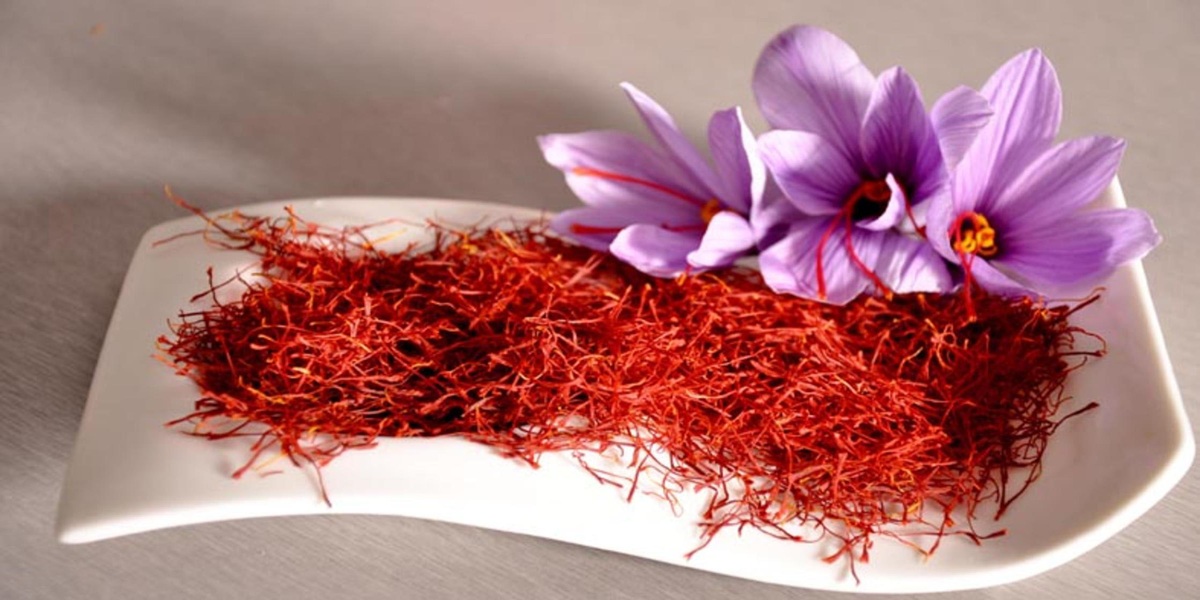Saffron, often referred to as “red gold,” is not just a prized spice in culinary traditions—it’s a powerhouse of health benefits backed by science. For centuries, this precious thread-like spice has been used in traditional medicine to enhance mood, improve digestion, and even support weight management. But what makes saffron so special?
Modern research has revealed that saffron is packed with bioactive compounds like crocin, safranal, and picrocrocin, which contribute to its potent antioxidant, anti-inflammatory, and neuroprotective properties. It’s not just about adding flavor and color to your dishes—saffron can play a significant role in boosting overall well-being. From reducing stress and enhancing cognitive function to promoting heart health and aiding digestion, saffron has a variety of scientifically proven benefits that make it a must-have in a healthy lifestyle.
One of the most fascinating aspects of saffron is its impact on mood and emotional well-being. Studies show that it can help reduce symptoms of anxiety and depression by increasing serotonin levels, making it a natural alternative for those looking to enhance mental health without relying on synthetic medications. Additionally, saffron has been linked to improved sleep quality, which is essential for overall health and weight management.
But that’s not all—saffron’s anti-inflammatory properties may also contribute to better digestion, reduced bloating, and improved gut health. With its ability to balance hormones and support metabolism, it’s no wonder that saffron is gaining popularity as a natural remedy for various health concerns.
If you’re looking for a natural way to enhance your well-being, saffron is worth exploring. In this guide, we’ll dive deeper into its various types, health benefits, and how to incorporate it into your daily routine. Keep reading to discover why saffron is more than just a spice—it’s a superfood for a healthier, happier life!
The Ultimate Superfood: Why Saffron Deserves a Place in Your Daily Routine
Saffron is not a one-size-fits-all spice—there are various types, each with unique characteristics and benefits. The quality of Saffron depends on factors like cultivation, harvesting methods, and the concentration of its active compounds. The most well-known types include:
1. Super Negin Saffron – The highest quality saffron, known for its long, deep-red threads and strong aroma. It contains the highest concentration of crocin, making it the most potent in terms of color, flavor, and health benefits.
2. Negin Saffron – Slightly lower in quality than Super Negin but still premium-grade, offering excellent color and medicinal properties.
3. Sargol Saffron – Derived from the tip of the saffron stigma, this type is rich in crocin and safranal, known for mood-enhancing and antioxidant properties.
4. Pushal Saffron – This variety includes some yellow parts of the stigma, making it slightly less concentrated but still beneficial for overall health.
5. Bunch (Dasteh) Saffron – The least processed form, containing full stigmas with yellow and red portions, often used in traditional medicine.
Now, let’s talk about why saffron is a health game-changer.
• Mood and Mental Health: Saffron acts as a natural antidepressant by boosting serotonin levels, which helps reduce anxiety, stress, and symptoms of depression.
• Brain Function and Memory: With its neuroprotective effects, saffron is being studied for its potential in preventing cognitive decline and supporting brain health, particularly in conditions like Alzheimer’s.
• Heart Health: The antioxidants in saffron help reduce oxidative stress, support blood circulation, and may lower the risk of heart disease.
• Anti-Inflammatory and Antioxidant Benefits: Saffron contains powerful compounds that fight free radicals, reducing inflammation, improving skin health, and promoting overall cellular health.
• Digestive Support: It helps with reducing bloating, improving gut health, and enhancing digestion, making it a great natural remedy for digestive disorders.
• Weight Management: By curbing appetite and supporting metabolism, saffron is increasingly recognized as a natural weight loss aid.
The versatility of saffron makes it easy to incorporate into your daily life. Whether you use it in tea, add it to meals, or take it as a supplement, the health benefits are undeniable. Understanding the right type of saffron to use can maximize its potential for both flavor and well-being.
Why Is Persian Saffron So Expensive?
Now, let’s talk about why saffron is a health game-changer.
• Mood and Mental Health: Saffron acts as a natural antidepressant by boosting serotonin levels, which helps reduce anxiety, stress, and symptoms of depression.
• Brain Function and Memory: With its neuroprotective effects, saffron is being studied for its potential in preventing cognitive decline and supporting brain health, particularly in conditions like Alzheimer’s.
• Heart Health: The antioxidants in saffron help reduce oxidative stress, support blood circulation, and may lower the risk of heart disease.
• Anti-Inflammatory and Antioxidant Benefits: Saffron contains powerful compounds that fight free radicals, reducing inflammation, improving skin health, and promoting overall cellular health.
• Digestive Support: It helps with reducing bloating, improving gut health, and enhancing digestion, making it a great natural remedy for digestive disorders.
• Weight Management: By curbing appetite and supporting metabolism, saffron is increasingly recognized as a natural weight loss aid.
Understanding the global saffron market reveals that the high cost of Persian saffron stems from the labor-intensive harvesting process. The delicate flowers must be handpicked, and the threads are carefully separated, requiring significant effort and time, which contributes to its expensive nature.
The versatility of saffron makes it easy to incorporate into your daily life. Whether you use it in tea, add it to meals, or take it as a supplement, the health benefits are undeniable. Understanding the right type of saffron to use can maximize its potential for both flavor and well-being.

How to Use Saffron for Weight Loss: Dosage and Best Practices
Incorporating saffron into your weight loss regimen requires understanding the appropriate dosage and methods of consumption to maximize its benefits safely. Saffron has been recognized for its potential to suppress appetite and enhance mood, which can aid in weight management.
Recommended Dosage:
For weight loss purposes, studies have utilized saffron extract in doses ranging from 88 to 90 milligrams every other day. This amount is approximately equivalent to 0.09 grams of saffron or about three saffron threads. It’s essential to adhere to these guidelines to avoid potential adverse effects associated with excessive consumption.
Methods of Consumption:
1. Saffron Tea: Steeping a few saffron threads in hot water for several minutes creates a flavorful tea. Consuming this tea before meals may help reduce appetite and prevent overeating.
2. Culinary Use: Adding saffron to dishes such as soups, stews, or rice not only enhances flavor but also allows for regular intake of the spice in controlled amounts.
3. Saffron Supplements: Standardized saffron extract supplements are available and can provide a consistent dosage. It’s crucial to choose high-quality products from reputable manufacturers to ensure purity and efficacy.
Best Practices:
• Consistency: Incorporate saffron into your diet regularly but moderately to achieve potential weight loss benefits.
• Hydration: Drinking saffron-infused water or tea can contribute to daily hydration, which is vital for overall health and weight management.
• Balanced Diet: Saffron should complement a balanced diet rich in fruits, vegetables, lean proteins, and whole grains.
• Physical Activity: Combining saffron consumption with regular physical activity enhances weight loss efforts and promotes overall well-being.
While saffron is generally safe when consumed in recommended amounts, excessive intake can lead to side effects such as nausea, dizziness, or allergic reactions. Pregnant or breastfeeding individuals and those on specific medications should consult a healthcare provider before incorporating saffron into their routine. 
By following these guidelines, saffron can be a valuable addition to a comprehensive weight loss strategy, offering both culinary delight and potential health benefits.
Best Ways to Use Saffron in Cooking & Drinks
Incorporating saffron into your weight loss regimen requires understanding the appropriate dosage and methods of consumption to maximize its benefits safely. Saffron has been recognized for its potential to suppress appetite and enhance mood, which can aid in weight management.
Saffron Tea vs. Saffron Supplements: Which One Works Best?
When considering saffron for weight loss, it’s important to evaluate the efficacy of different consumption methods, primarily saffron tea and saffron supplements. Both forms have their advantages and considerations.
Saffron Tea:
Pros:
• Natural Integration: Saffron tea allows for the incorporation of saffron into your diet in its natural form, providing not only potential weight loss benefits but also a soothing beverage experience.
• Hydration: Consuming saffron tea contributes to daily fluid intake, essential for metabolism and overall health.
Cons:
• Variable Dosage: The concentration of saffron in tea can be inconsistent, making it challenging to measure precise dosages.
• Preparation Time: Regular preparation of saffron tea requires time and effort, which may not be convenient for everyone.
Saffron Supplements:
Pros:
• Standardized Dosage: Supplements offer precise and consistent dosages of saffron extract, ensuring you receive the intended amount with each serving.
• Convenience: Capsules or tablets are easy to consume and integrate into daily routines without the need for preparation.
Cons:
• Quality Variations: The supplement market varies in quality; some products may contain fillers or lack purity. It’s crucial to select supplements from reputable brands.
• Cost: High-quality saffron supplements can be more expensive compared to using saffron threads for tea.
Which One Works Best?
The effectiveness of saffron in weight loss largely depends on consistent and adequate intake. Supplements provide a controlled dosage, which may lead to more reliable outcomes in appetite suppression and weight management. However, if you prefer a natural approach and enjoy herbal teas, saffron tea can be beneficial, keeping in mind the potential variability in dosage.
Choose the form that aligns with your lifestyle and preferences. If opting for supplements, ensure they are from reputable sources with clear labeling of saffron content. For saffron tea, use high-quality saffron threads and standardize your preparation method to maintain consistency.
Regardless of the form, combining saffron consumption with a balanced diet and regular exercise is essential for achieving desired weight loss results.
Global Saffron Market: Trends, Prices, and Future Predictions
When considering saffron for weight loss, it’s important to evaluate the efficacy of different consumption methods, primarily saffron tea and saffron supplements. Both forms have their advantages and considerations.
Global saffron market trends reveal an increase in demand for saffron across the world, especially in Europe and the Middle East, as its health benefits become more widely recognized. Despite the increase in demand, Persian saffron remains expensive due to its labor-intensive harvesting process.
Real-Life Results: What People Say About Saffron and Weight Loss
Personal experiences with saffron for weight loss vary, reflecting individual differences in metabolism, lifestyle, and adherence to supplementation. While scientific studies provide controlled data, real-life testimonials offer practical insights into saffron’s effectiveness.
Positive Experiences:
• Appetite Suppression: Many users report a noticeable decrease in appetite and reduced cravings for snacks between meals after incorporating saffron into their diets. This aligns with studies suggesting saffron’s role in increasing serotonin levels, which can influence satiety. 
• Mood Enhancement: Some individuals experience improved mood and reduced emotional eating, contributing to better dietary choices and weight management.
• Gradual Weight Loss: Users have observed gradual weight loss over weeks, attributing it to decreased calorie intake and better portion control facilitated by saffron consumption.
Neutral or Mixed Experiences:
• Variable Results: Not all users experience significant appetite suppression or weight loss, highlighting individual variability. Factors such as baseline diet, physical activity, and metabolic rate play crucial roles.
Negative Experiences:
• Minimal Effects on Weight Loss: A small percentage of users claim they saw little to no impact on their weight despite regular saffron consumption. This may be due to unrealistic expectations or lack of a well-balanced diet and exercise routine.
• Mild Side Effects: Some users report mild digestive discomfort or headaches when taking saffron supplements, usually when exceeding recommended dosages.
• Delayed Results: While some users experience appetite suppression quickly, others find that it takes several weeks of consistent use before noticing a difference in their eating habits.
Real-life experiences suggest that saffron can be a helpful tool for weight management, particularly for appetite control and reducing emotional eating. However, it is not a magic bullet. For the best results, saffron should be used alongside a healthy diet, regular exercise, and mindful eating habits. Choosing high-quality saffron and maintaining consistency in consumption are key to achieving noticeable benefits.

Are There Any Side Effects? What You Need to Know
Saffron is generally considered safe when consumed in moderate amounts, but excessive intake can lead to potential side effects. Understanding these risks is crucial to ensure safe and effective use of saffron for weight loss or general health benefits.
Common Side Effects of Saffron:
• Mild Digestive Issues: Some people may experience nausea, bloating, or an upset stomach after consuming saffron, particularly in higher doses.
• Drowsiness or Dizziness: Saffron’s impact on serotonin levels can cause mild drowsiness or dizziness in some individuals.
• Allergic Reactions: Rarely, some people may have allergic reactions to saffron, leading to symptoms such as skin rash, itching, or respiratory issues. Those allergic to plants in the Iridaceae family (such as iris and gladiolus) may be at a higher risk.
Serious Side Effects of High Doses:
• Blood Pressure Changes: Some studies suggest that saffron may lower blood pressure, which could be a concern for those already taking antihypertensive medications.
• Increased Heart Rate: High doses of saffron have been associated with palpitations or an irregular heartbeat in sensitive individuals.
• Risk During Pregnancy: Saffron has been traditionally used to stimulate uterine contractions. Pregnant women should avoid excessive saffron intake to prevent complications.
Safe Dosage Guidelines:
• For weight loss and appetite control, 88-90 mg per day is considered effective and safe.
• Consuming more than 5 grams of saffron in one sitting can be toxic and should be strictly avoided.
• Individuals with pre-existing medical conditions or those on medication should consult a doctor before using saffron regularly.
Saffron is a natural and generally safe supplement when used within the recommended limits. However, consuming excessive amounts can lead to unwanted side effects. If you are new to saffron, start with a low dosage and monitor your body’s response. When used correctly, saffron can offer numerous health benefits with minimal risk.
Saffron and Weight Loss: Myth vs. Reality
There is a lot of hype around saffron as a weight loss remedy, but how much of it is true? Let’s separate fact from fiction and look at what scientific research actually says about saffron’s effectiveness for shedding pounds.
1: Saffron Burns Fat Directly
Reality: Saffron does not have direct fat-burning properties like thermogenic supplements (e.g., caffeine). Instead, it helps control appetite and emotional eating, leading to reduced calorie intake and gradual weight loss.
2: Saffron Alone Will Make You Lose Weight
Reality: No single food or spice can cause significant weight loss without lifestyle changes. Saffron is most effective when combined with a healthy diet and regular exercise.
3: The More Saffron You Take, The Faster You Lose Weight
Reality: Taking excessive amounts of saffron does not accelerate weight loss and can cause side effects. Research-backed doses (88-90 mg per day) are sufficient to see benefits over time.
4: Saffron Supplements Are All the Same
Reality: The quality of saffron supplements varies widely. Some products contain fillers or low-quality saffron, making them less effective. Always choose high-purity saffron extracts from reputable sources.
5: Saffron Works for Everyone
Reality: Individual results vary based on metabolism, diet, and lifestyle. While saffron can help with appetite suppression, some people may experience minimal effects.
Saffron is not a magic weight loss cure, but it can be an effective tool for reducing cravings, emotional eating, and supporting overall weight management. To see real results, use saffron consistently, maintain a balanced diet, and stay physically active. When combined with the right habits, saffron can be a valuable addition to a sustainable weight loss journey.
Saffron: Nature’s Secret to Better Health and Longevity
Saffron is more than just a spice—it’s a powerful natural remedy with scientifically proven benefits for both mind and body. Whether you’re looking to enhance your mood, support cognitive function, or improve digestion, saffron offers a natural solution backed by research.
The different types of saffron each have unique properties, but they all contribute to overall well-being, mental clarity, and physical health. By choosing high-quality saffron and incorporating it into your daily routine, you can experience its full potential in a natural and sustainable way.
If you’re searching for a natural way to boost your health, reduce stress, and improve digestion, saffron is a must-try superfood. Now that you know its incredible benefits and various types, it’s time to start using it in your daily life.
Embrace the power of saffron and take the first step toward a healthier, more vibrant you!




